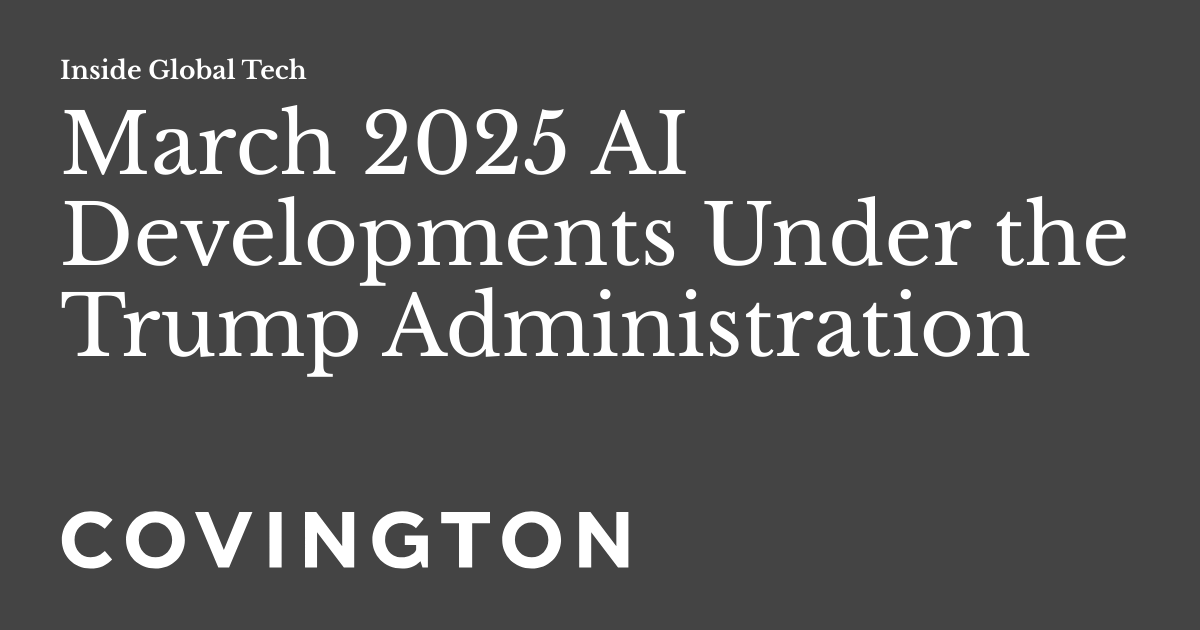AI Advances in March 2025 During the Trump Administration

Overview of AI Policy Developments Under the Trump Administration
This article continues to explore the AI policies, executive orders, and actions undertaken by the Trump Administration, focusing specifically on March 2025. Insights from previous parts of this series can be accessed here.
Public Input on the AI Action Plan
On March 15, 2025, the White House’s Office of Science and Technology Policy (OSTP) and the National Coordination Office for Networking and Information Technology Research and Development concluded a period for public feedback regarding the AI Action Plan. This process followed a Request for Information (RFI) that was issued on February 6, 2025, as part of President Trump’s executive order on AI. The RFI encouraged stakeholders to share their views on critical policies to be included in this new action plan.
Major Focus Areas for Feedback
The RFI outlined 20 broad topics for which public comments were sought, including:
- Data Centers: Standards for the management and operation of data centers.
- Data Privacy and Security: Guidelines to ensure the protection of sensitive data.
- Technical and Safety Standards: Establishing safety protocols for AI deployment.
- Intellectual Property: Clarifying ownership rights related to AI-generated work.
- Procurement: Outlining procedures for federal contracts involving AI technologies.
The outreach received a robust response, tallying a total of 8,755 submitted comments from various stakeholders, including non-profit organizations, academic institutions, and AI companies. The finalized AI Action Plan is anticipated to be released by July 2025.
NIST Initiatives for AI Standards
In March 2025, the National Institute of Standards and Technology (NIST) introduced several initiatives aimed at enhancing AI research and establishing standards for its use.
Key AI Initiatives Launched by NIST
GenAI Image Challenge: Launched on March 19, this challenge invites participants from academia and industry to develop and submit AI models that can both generate and detect AI-created images.
Adversarial Machine Learning Report: On March 24, NIST published a comprehensive report detailing various adversarial attack strategies aimed at AI systems, offering guidance to protect these systems against malicious manipulation.
- AI Standards Zero Drafts Project: Announced on March 25, this pilot project aims to create preliminary drafts for new AI standards. It will focus on specific topics such as:
- Transparency and documentation of AI systems.
- Evaluation and testing standards for AI.
- Defining terminology relevant to AI system design.
- Measures to mitigate the risks associated with synthetic content.
NIST has called for stakeholder engagement on these topics to refine the draft standards further.
Leadership Changes in AI Policy
On March 25, the Senate confirmed Michael Kratsios as the Director of the Office of Science and Technology Policy, voting 74-25. Kratsios previously served as the Assistant to the President for Science and Technology and is credited with significantly influencing U.S. AI policy. In his role, he aims to develop new technical standards for AI and collaborate with the Department of Commerce to evaluate the U.S. AI Safety Institute.
In a letter dated March 26, President Trump instructed Kratsios to focus on three main challenges:
- Technological Supremacy: Ensure that the U.S. maintains a lead in critical technologies, including AI, by fostering research and easing regulatory constraints.
- Revitalizing Science and Technology: Attract talent, facilitate research, and safeguard America’s intellectual property.
- Economic Growth: Leverage scientific advancements and technology to improve the lives of American citizens.
Legislative Responses to DeepSeek AI
As concerns regarding DeepSeek—the AI model and its implications for U.S.-China AI competition—grew, several Congressional members and state officials advocated for regulation.
Responses from Lawmakers
On March 3, Representatives Josh Gottheimer and Darin LaHood expressed their concerns in letters sent to governors across 47 states, urging them to prohibit the use of DeepSeek technology on government devices due to potential data privacy and security risks. This call for action was motivated by the No DeepSeek on Government Devices Act introduced in February.
Additionally, on March 6, Montana Attorney General Austin Knudsen, along with 20 other state attorneys general, appealed to Congress to support the act. Various states, including New York and Iowa, have already enacted their own bans on DeepSeek. Recent actions taken included:
- South Dakota: Imposed a ban on DeepSeek use for state employees and contractors.
- Oklahoma: Announced that DeepSeek’s AI models should not be accessed on state-owned devices due to security concerns.
These responses exemplify the ongoing scrutiny regarding the use of AI technologies in governmental contexts, emphasizing the importance of addressing security risks associated with advanced AI systems.






